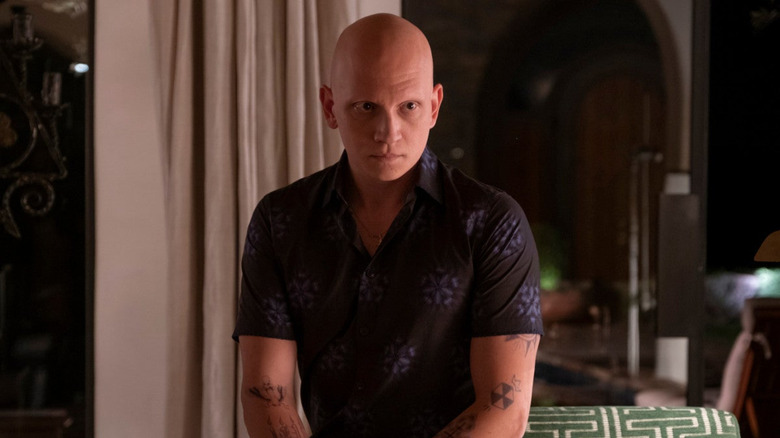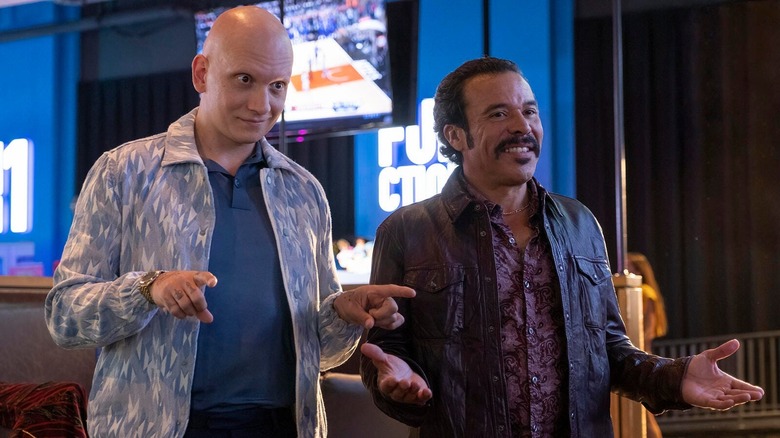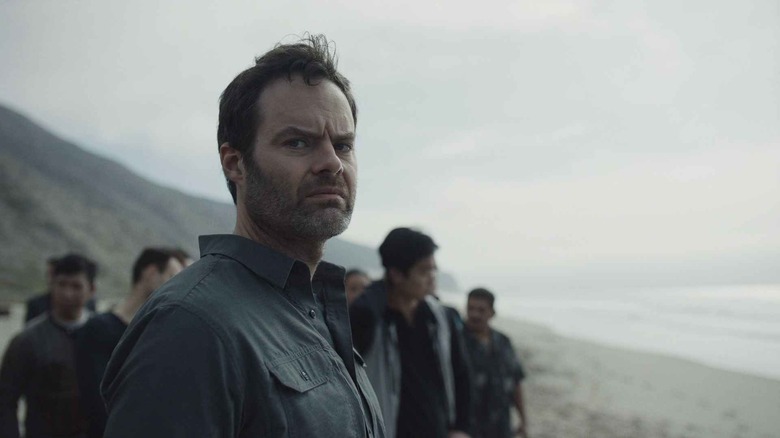How Bill Hader Made Hank And Cristobal's Last Fight In Barry Seem So Intimate
Spoilers follow.
HBO is riding high right now with the final seasons of "Barry" and "Succession" inching closer and closer to two distinct endgames that are sure to hit audiences right in the chest, albeit in totally different ways. Creator and writer Jesse Armstrong has already played the shocking death card for the billionaire sect with the demise of larger-than-life patriarch Logan Roy. On the other hand, episode 4 of season 4 of "Barry" certainly had a tragic, heartbreaking death, but it's surely not the last murder planned. For a series that was supposed to be a comedy, "Barry" is amassing a pretty high kill count.
Specifically, the death of Cristobal (Michael Irby) in "It Takes a Psycho" was definitely a gut punch for director Bill Hader when tasked with shooting the sequence when the day finally came. "It was pretty tense," Hader told The Wrap. "It's a very sad scene, and I think the actors are just unbelievable in that scene." Anthony Carrigan as NoHo Hank is tremendous in the moments leading up to Cristobal's death. Initially, Hader planned to shoot the sequence differently but decided it could be even more intimate and tragic if they shot it from another perspective. According to Hader:
"The thing I got excited about was what if, when they're walking out, we've got the car there and we just do a slow push-in on them kind of point of view of someone who loves them, who's giving them space, but they're going away from us and there's this hopelessness to it. It makes it feel like such a private moment, and [cinematographer] Carl [Herse] really dug that and our steadicam operator Neil did an amazing job with that because that's a very hard shot to do."
Finding the emotion of the scene through a re-write
Part of what makes "Barry" so engrossing is the feeling of immediacy and spontaneity the show possesses, a trait that's found in more tender moments and in the spontaneous instances of violence that seemingly come out of nowhere. That's what real life feels like sometimes, whether you're a struggling actor or a crime lord. For those moments to have an even greater impact, Hader understands that what's planned on the day when you walk onto set isn't always the best idea. Changing the camera position and using a complex Steadicam shot already made the scene between Hank and Cristobal feel more intimate, but there were also some changes to Taofik Kolade's script that Hader and Corrigan made to make Cristobal's death hit even harder.
Hader spoke about telling Carrigan about the scene for the first time and how that informed his performance when it was time to shoot, telling The Wrap:
"Initially, the way it was written the first time, you stayed with Cristobal and he got in the car and then he got shot. When I first told Anthony what was going to happen he was like, 'Holy s***,' and then he goes, 'I think Hank's feeling emotions but he's trying to bury it, he just doesn't want to feel it,' and then the minute he said that I went, 'Oh that's what you should be seeing,' so I started rewriting the scene on the phone with Anthony."
Cristobal's death would've been a surprise no matter what, but these small technical and performance-driven changes are great examples of how to make a scene better.
Barry's ten minute film school
With so much attention on "Barry" at the moment, these illuminating anecdotes serve as a kind of film school for would-be artists. Hader has certainly learned a lot after four seasons and has proven that he's the only one that could have directed the final season. As he's grown as an artist, the show has morphed into a surprisingly profound commentary on finding your place in the world. Barry Berkman, the assassin, wanted a different life, even going so far as to invent his stage name, Barry Block. His pretentious and disreputable acting teacher, Gene Cousineau (Henry Winkler) was supposed to be a stand-in father figure for Barry's manipulative handler, Monroe Fuches (Stephen Root), but he was betrayed and sent to prison by Cousineau, one of the only people he trusted. He doesn't know who he is anymore. Barry just thinks he can still have it all, no matter what the cost.
With the unexpected time jump at the end of "It Takes a Psycho," Barry is now the father he never had, with a child he probably should have never brought into the world. For Hader, the existential journey that "Barry" has been on has also been a challenging artistic endeavor that has pushed the boundaries of what a television show can be. When the last episode finally airs, Hader has no shortage of ideas to explore next. One project he's looking to get made is a horror movie, which seems like the perfect direction for Hader to go in after how harrowing this final season has already been.


